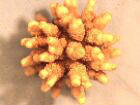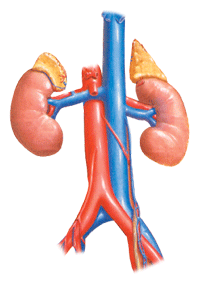Why a Kidney Cleanse?
|

Kidney Stone
A kidney
stone is a hard mineral and
crystalline material formed within the
kidney or urinary tract. Kidney stones
are a common cause of blood in the urine and
pain in the abdomen, flank, or groin. Kidney
stones occur in 1 in 20 people at some time
in their life. |
A
kidney cleanse is a procedure which is used to dissolve deposits
inside the kidneys that can lead to kidney stones.
The function of the kidneys is to
excrete urine, which contains the end products of metabolism, and to
help regulate the wastes, electrolyte, and acid content of the
blood. To accomplish this, the kidneys conserve water and balance
electrolytes by reabsorbing the exact amounts required minute by
minute and sending the excess out through the urinary tract. This is
done through a complex network of electrochemical responses,
including the brain, nervous system, and endocrine (hormone
producing glands).
If you have been eating a diet high in
refined carbohydrates or sugar, and low or deficient in good fats,
your body simply may not have the raw materials available to produce
the hormones it needs to properly guide kidney function.
A kidney cleanse also
is done in order to cleanse the delicate kidney tubules and
supporting tissues from foreign substances which have collected
there due to the body's inability to eliminate them via the usual
way, namely the ureters, urinary bladder, and urethra.
It is now known that
hard minerals (mainly from our
drinking water) can not be assimilated by our bodies, and begins
to build up in our kidneys and other organs, contributing to many
diseases.
"Water Hardness" is the underlying
cause of many, if not all, of the diseases resulting from poisons in
the intestinal tract. These (hard minerals) pass from the intestinal
walls and get into the lymphatic system, which delivers all of it's
products to the blood, which in turn, distributes to all parts of
the body. This is the cause of much human disease. - Dr.
Charles Mayo (Mayo Clinic, Rochester, Minnesota)
What we as scientists and the public
have never realized is that minerals collected in the
body from water are all inorganic minerals, which
cannot be assimilated
(digested) by the body. The only minerals that the body can utilize
are the organic minerals (from fruits and vegetables). All other
types of minerals are foreign substances to the body and must be
disposed of or eliminated. - Allen E.Banik, M.D.
his book: "The Choice is Clear"
-
What do the kidneys do?
 Kidneys
are truly impressive organs. The more you learn, the more you’ll
understand why you want to help keep them healthy.
Kidneys
are truly impressive organs. The more you learn, the more you’ll
understand why you want to help keep them healthy.
Another word for kidney is renal. You may hear your
doctor talk about renal function or read materials that mention
renal failure. Whenever you see or hear the word renal, you will
know the subject is about kidneys.
They kidneys have a
couple of different functions. Their main purpose of the
kidney is to separate urea, mineral salts, toxins, and other waste
products from the blood,
especially a nitrogen-containing compound called urea.
The kidneys control
the quantity and quality of fluids within the body, conserving
water, salts, and electrolytes. They also produce hormones and
vitamins that direct cell activities in many organs. The hormone
renin, for example, helps control blood pressure. When the kidneys
are not working properly, waste products and fluid can build up to
dangerous levels, creating a life-threatening situation. They
also produce a hormone called erythropoietin, which tells the bone
marrow to make red blood cells, and one called calcitriol helps to
keep bones strong.
Among the important substances the kidneys help to
control are sodium, potassium, chloride, bicarbonate HCO3- (measured
indirectly as CO2), pH, calcium, phosphate, and magnesium.
About 180 litres of water filters through your
kidneys every day, but only about 1.5 liters finally leaves your
body as urine.
At least one kidney must function
properly for life to be maintained.